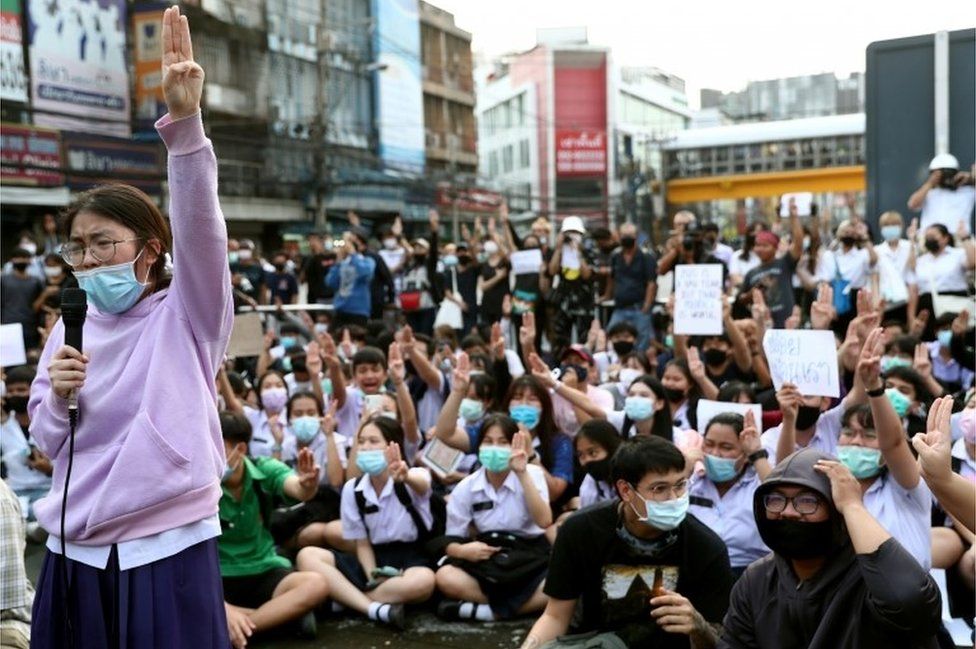Thailand protests: Authorities move to ban Telegram messaging app
- Published

Thai authorities are reported to have ordered internet providers to block the Telegram messaging app, which has been used by anti-government protesters.
A leaked document outlining the plans was shared on social media.
Police also threatened to shut four news outlets for violating a decree issued last week to end the rallies.
Pro-democracy activists have held months of protests calling for the resignation of the prime minister and curbs on the powers of the monarchy.
Members of the student-led movement have gathered in defiance of an order banning protests and want Prime Minister Prayuth Chan-ocha - a former army chief who seized power in a 2014 coup - to resign.
Their demands for reform have since grown to include questioning the role of the monarchy, an institution long seen as sacred in Thailand.
Authorities have failed to curb the rallies since they issued an emergency order on Thursday, with protesters still gathering daily, largely peacefully, in Bangkok and other parts of the country.
Protesters in Thailand shield themselves as riot police try to disperse crowds
At least 80 people have been arrested since Tuesday. Those detained risk long sentences if they are found to have breached Thailand's strict lese majeste laws, which ban criticism of the monarchy. Anyone found breaking the law could be jailed for up to 15 years.
Why is Thailand trying to ban Telegram?
The government's plan to block Telegram was reported by local media on Monday after a document marked "very confidential" was leaked and shared widely on social media. Telegram is a popular secure messaging app that has been used by activists to organise protests at short notice.
The document - apparently produced by Thailand's digital economy ministry, which has the power to censor the internet in Thailand - was sent to the National Broadcasting and Telecommunications Commission.
"The Ministry of Digital Economy and Society is seeking your co-operation to inform the Internet Service Providers and all mobile network operators to suspend the use of Telegram app," it said.
Separately, police told reporters they had instructed the digital ministry to restrict Free Youth's group on Telegram. The group has played a key role in organising protests in recent months.
It is unclear how effective the order will be in curtailing the democracy movement.
In a separate order, Thai police said they were investigating four well-known news organisations over their live-reporting of the protests. Prachatai, Voice TV, The Reporters and The Standard have reported extensively from the protest sites.
How did the protest movement begin?
Thailand has a long history of political unrest and protest but a new wave began in February after a popular opposition political party was ordered to dissolve.
The order followed elections in March last year - the first since the military seized power in 2014 and the first chance to vote for many young people and first-time voters. The elections were seen as an opportunity for change after years of military rule.
Prayuth Chan-ocha, who had the all-important support of the military, was re-installed as prime minister. The pro-democracy Future Forward Party (FFP), with its charismatic leader Thanathorn Juangroongruangkit, garnered the third-largest share of seats and was particularly popular with young, first-time voters.
But in February a court ruled the FFP had received a loan from Mr Thanathorn which was deemed a donation - making it illegal - and the party was forced to disband, prompting thousands of young Thais to join street protests.
The protests were halted by Covid-19 restrictions, which banned gatherings, but they began again in June when a prominent pro-democracy activist went missing.
Wanchalearm Satsaksit, who had been living in Cambodia in exile since 2014, was reportedly grabbed off the street and bundled off into a vehicle. Protesters accused the Thai state of orchestrating his kidnapping - a charge police and government officials have denied.
In recent months, the protesters have challenged the king's decision to declare Crown wealth as his personal property, which made him by far the wealthiest person in Thailand. It had until now been notionally held in trust for the benefit of the people.
There have also been questions over the king's decision to take personal command of all military units based in Bangkok - a concentration of military power in royal hands unprecedented in modern Thailand.